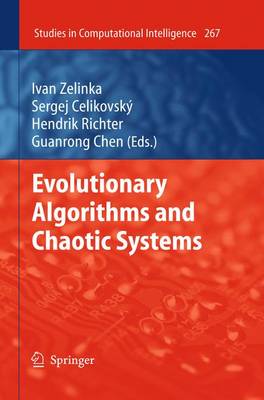Studies in Computational Intelligence
1 primary work
Book 267
Evolutionary Algorithms and Chaotic Systems
Published 23 February 2010
Ever since the historical discovery of the now-famous Lorenz system in 1963, a large number of nonlinear systems that can produce chaos have been - served,constructedandanalyzed. Infact,chaostheoryhasbecomeindispe- able for science and engineering at all levels of research today. The most - tive recent researchincludes chaos controland chaos synchronization,among others, with a visible trend toward real-world applications. The book titled "Evolutionary Algorithms and Chaotic Systems", edited by Ivan Zelinka, Sergej Celikovsky, Hendrik Richter and Guanrong Chen, is a timely volume to be welcome by the chaos community as well as c- putational intelligence community and beyond. This book is devoted to the studies of common and related subjects in two intensive research ?elds of chaos theory and evolutionary computation. It was not typical that e- lutionary computing techniques are used for e?ective chaos control, chaos synchronization,chaosidenti?cation, andin particularfor chaosanalysisand synthesis, therefore this edition of collective state-of-the-art articles on such interdisciplinarysubjects isespecially valuableforthescienti?candengine- ing communities.
For these reasons, I enthusiastically recommend this book to our scientists and engineers working in the ?elds of nonlinear dynamics, evolutionary algorithms, control theory, circuits and systems, and scienti?c computing alike. University of California at Berkeley, September 2009 Leon O. Chua Preface Deterministic chaos is a fairly active area of research in the last few decades. Well known chaotic attractors can even be produced by some simple three-dimensional autonomous systems of ordinary di?erential equations, for example the Lorenz system, which originates from modelling of atmospheric dynamics.
For these reasons, I enthusiastically recommend this book to our scientists and engineers working in the ?elds of nonlinear dynamics, evolutionary algorithms, control theory, circuits and systems, and scienti?c computing alike. University of California at Berkeley, September 2009 Leon O. Chua Preface Deterministic chaos is a fairly active area of research in the last few decades. Well known chaotic attractors can even be produced by some simple three-dimensional autonomous systems of ordinary di?erential equations, for example the Lorenz system, which originates from modelling of atmospheric dynamics.
